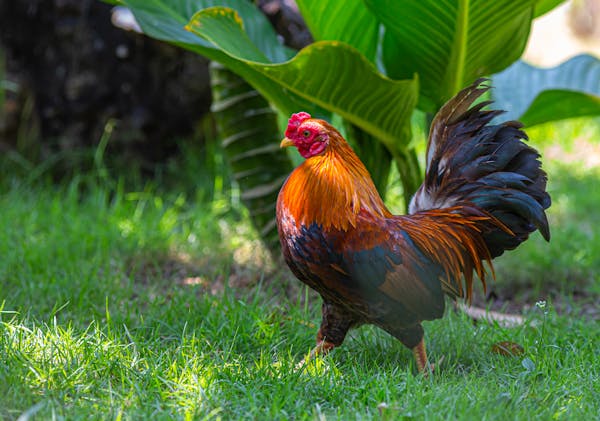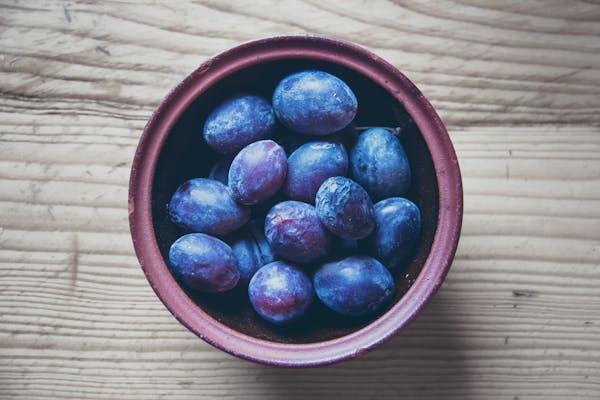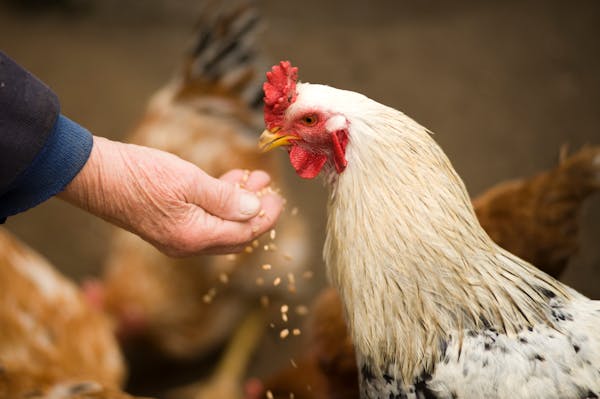
Fruits can serve as tasty treats for your chickens.
However, not all fruits should be consumed by chickens.
Among those which are good for chickens, there is the right serving proportion OTHERWISE they become harmful.
These suitable fruits might not be safe as a whole for the chicken. It could be their leaves or seeds which are poisonous, and you have to be guided.
If plums are your choice of fruit, you need to:
-
Be able to give an explicit answer to the question: “Can chickens eat plums?”
-
Find out: “How chickens should and should not eat plums.” Include the parts that could be poisonous.
-
Learn about the “Application of plums in feeding chickens.”
Can chickens eat plums?

Literally, chickens can eat plums (as demonstrated in this video). Chickens are one type of omnivore prone to peck on anything they come across. But I am sure what you want to know is the safety attached. To answer this, we need to find out the constituents of plums in relation to the needs of chickens.
The chemical properties of plums
Plums (Prunus domestica) are regarded as one of the stone fruits because they have a stone-like seed in their pit. Their skin can be red, purple, green, orange and yellow. The flesh is usually yellow, orange or pink.
They are rich in antioxidants, vitamins (such as A, B, C, D, E and K), sugars (like sucrose, fructose, and glucose), organic acids (such as matric acid, succinic acid and citric acid), minerals (like potassium and calcium), protective polyphenols, fiber and water. They also contain a trace amount of proteins.
Benefits of feeding chicken plums
Plums can serve as a tasty treat to balance the nutritional intake of chickens when served in the right proportion.
Plums are good sources of antioxidants in the body system of chickens, which helps to combat free radicals. Free radicals cause the same harm in the body of chickens as with humans. They damage body cells, impair the immune system of the chickens, and make them susceptible to diseases and infections. High amounts of free radicals in chickens also cause oxidative stress. Plums can be served as sources of antioxidants to remediate this.
Containing about 5.54 mg% - 6.12 mg% of vitamin C, plums can be served to boost the immune system of the chickens and help in reducing inflammation. It is recommended for sick birds.
Being a fresh fruit, plums contain a generous amount of water. This makes them good sources of hydration and refreshment for chickens.
Plums supply calcium to chickens, and they are useful for egg production. The fibres are useful in regulating the bowels of chickens and preventing constipation. Plums have also been associated with the treatment of coccidiosis in chickens.
How chickens should and should not eat plums
Having confirmed that plums are healthy for chickens, it is important to know the right way to serve them.

The method in which it should be served
Ripe plums should be washed and made free of dirt, pollutants or preservation from where they have been stored or harvested.
They can be chopped into cubes and served on a tray for the chickens. This makes it more convenient for the chickens to feast on the plums. Serving it this way prevents choking and is particularly convenient for the chicks.
In hot summer, plums can be frozen and served to the chickens. This helps to regulate their body temperature and keep them warm. It also helps to keep the chickens hydrated and refreshed.
The seed should be removed from the plums before serving the chickens. They can be served along with other fruits, such as apples, strawberries and blueberries.
The quantity and how often chickens should consume plums
Chicks require lesser amounts of plums than matured chickens, while layers require them a little more than broilers. Plum is a good source of calcium required by layers for egg production.
Although plums are good sources of vitamins and minerals for chickens, they are still deficient in essential nutrients like proteins. Chickens do not require sugars in the same quantity as humans; thus, they shouldn't be given plums in the same ratio as humans. It is recommended to be served once or twice a week and in a 10% ratio when served.
The part and form of the plums that shouldn't be consumed
All parts of plums are healthy for feeding chickens except the seed. They are not safe for the chickens and should be disposed of out of the reach of the birds.
The dried form of plums, also known as ‘Prunes,” is not recommended for direct consumption by chickens. This is because the Prunes, having lost their moisture, are more concentrated than fresh plums. They contain over four times more sugar than fresh plums. Most prunes contain the seeds which are harmful to chickens.
Application of plums in feeding chickens
Since plums are healthy for chickens, a rearer’s next concern would be how to incorporate them into their feeds.

Chicken feeds that incorporate plums
Dried plums (prunes) can be incorporated into chicken feeds to supply antioxidants, vitamins and minerals to the birds. The guideline is to serve in a ratio of 1:9 once or twice a week, along with the standard diet.
Such a diet helps to combat heat stress in the poultry. Heat stress is detrimental to the health of chickens and leads to a reduction in body weight and, consequently, economic value. Plums as prunes, when served as dietary supplements, help in the expression of genes responsible for heat shock. This enables the chicken to resist heat stress.
Application of plum extracts
Various extracts from plums have served as useful additives in chicken feeds.
This extraction begins with a natural fermentation process that lasts for two to three months. The plum concentrate is recovered afterwards with plum cakes as a by-product. Other extracts include plum oil, fermented plum gourd, plum concentrate extract, fermented plum gourd extract, plum powder, plum fibre and plum puree.
As additives, these extracts are good sources of organic acid. Plums contain large amounts of citric acids. Citric acids are used as substitutes for antibiotics used in treating chickens owing to their antimicrobial properties. There is a need to eliminate antibiotics in the treatment of chickens due to the development of antibiotic resistance, which in turn makes the meat unhealthy for consumption. Plum extracts, which are rich in citric acid, have been able to meet this need.
Plum extracts are also used in place of phosphate and sodium for preservatives. They aren't toxic and help to preserve the natural protein in chickens, thereby retaining its natural taste.
Probiotics associated with plums that are beneficial to chickens
The fermented extracts of plums might not be sources of probiotics themselves, but their presence increases the microbial activities of probiotics such as Bacillales, Peptostreptococcaceae, Christensenellaceae, Bacillaceae and Anaerotruncus.
They promote the overall gut health of chickens and fight pathogens.
Conclusion
As omnivores, Chickens can eat plums. Plums are sources of antioxidants, vitamins and minerals, which can be served as tasty treats or dietary supplements in chicken once or twice a week.
For safety, the seeds of plums should be avoided, and they should be served in the right ratio.







Leave a Comment: